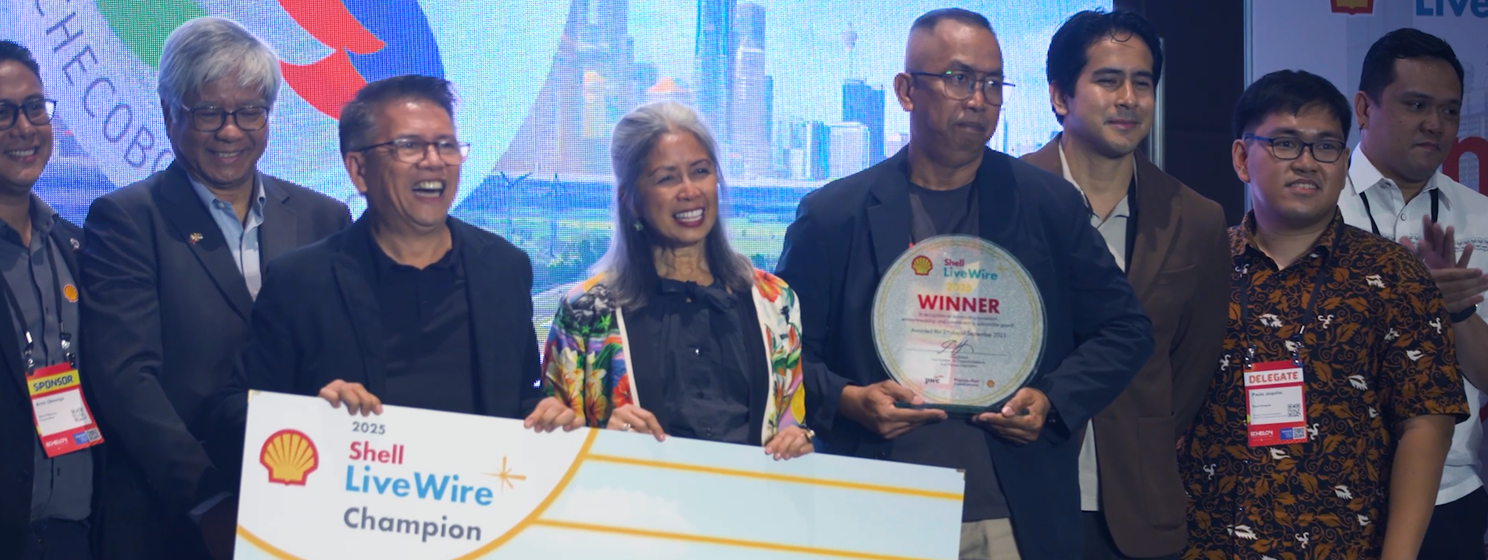|
Getting your Trinity Audio player ready...
|
The Philippines’ startup ecosystem is heating up, and it isn’t just about apps and e-commerce anymore. A new wave of innovators proves that real-world problems such as carbon emissions, agricultural waste, and food security can be solved with emerging technology, smart business models, and a passion for sustainability.
At the center of this movement is Shell LiveWire, Shell Pilipinas Corporation’s flagship entrepreneurship development program. Now in its fifth year in the country, LiveWire provides mentorship, market access, and most importantly, equity-free funding of up to PHP1 million (US$17,508) for winners.
The program has already supported 150 startups and community enterprises, creating over 800 jobs during the pandemic. More than a competition, it’s a platform that provides Filipino founders the tools to scale solutions that can change industries.
“We’re not merely witnessing a pitch competition,” said Sebastian “Baste” Quiniones, Jr., Executive Director of Pilipinas Shell Foundation, Inc. “We’re celebrating a thriving community that champions Filipino ingenuity…homegrown solutions that can drive inclusive growth, not only locally, but throughout Asia and hopefully all around the world.”
This year’s finalists: Pili AdheSeal, Greentech Ecobooster, and AgriDOM show how technology, including blockchain, AI, and advanced engineering, can create businesses that are both profitable and planet-friendly.
Turning tree resin into a circular economy
Engineer and entrepreneur Mark Kennedy Bantugon leads Pili AdheSeal, which converts agricultural waste from the native pili tree into a two-in-one adhesive and sealant. The product is fragrant, non-toxic, and unlike traditional adhesives, its leftover material can be turned into safe fertilizer.
“We recycle and upcycle over 200 million kilograms of annual agricultural pili waste resin into our sustainable product,” Bantugon explained. Their circular economy model incentivizes customers to return packaging for reuse while providing farmers with fertilizers that encourage more pili cultivation. “We are not just producing an eco-friendly product,” he added. “We’re rooting this innovation in environmental, health, social, and economic impact.”
Bantugon also sees a role for emerging tech. “AI can empower our production processes if used mindfully,” he said, highlighting how digital tools can help manage logistics and scale operations efficiently.
Fuel savings powered by blockchain
Transport accounts for nearly a third of global greenhouse gas emissions, and Greentech Ecobooster is tackling the problem at the engine level. Their three-in-one plug-in boosts power, saves fuel, and slashes emissions, with the Department of Science and Technology (DOST) tests showing up to 92% less fuel use and a 25–60% drop in carbon dioxide.
“This isn’t just greenwashing,” said co-founder Rowena Bernardo. “You buy it once and it really solves the problem from the root.” The team began in the motorcycle racing scene but quickly realized the technology’s potential for cars, boats, power generators, and more. Tricycle drivers using the device save between PHP50 ($0.88) and PHP120 ($2.10) per day on fuel, while fishermen spending PHP1,800 ($31.51) on gas per trip can stretch every peso further.
Greentech is turning to blockchain to manage growth across multiple markets. “That is the technology we’re using for circular economy,” Bernardo explained. Their platform, Partner of the Planet, uses smart contracts to connect creators, businesses, and drivers directly, meaning no middlemen siphoning off data or profits.
“Blockchain ensures easy integration and expansion. Each individual controls their own database; community data isn’t for sale,” she said. It’s a textbook Web3 use case: decentralized, transparent, and empowering for grassroots users.
Drones bring farming into the digital age
Agriculture remains one of the hardest sectors to modernize, but AgriDOM is breaking barriers with a “drone-as-a-service” model. Instead of buying expensive equipment, farmers simply pay per task, making precision farming accessible to even the smallest plots.
“With AgriDOM we’ve proven that technology adoption really makes farming more efficient,” said AgriDOM’s Chief Operating Officer Jennifer Joy Subang. “You can finish a hectare in just five to seven minutes, reducing production costs while increasing yield.” Drone applications cut water use by up to 90% and drastically reduce fertilizer and pesticide needs.
Beyond efficiency, AgriDOM’s drones gather valuable data that can be analyzed with AI to predict crop issues before they happen. “Farmers don’t just address problems, they become scientists,” Subang said, envisioning predictive farming where technology mitigates risk and boosts food security.
Collaboration for a Greener Future
For Department of Information and Communications Technology (DICT) Director and competition judge Jhino Ilano, the event underscored how partnerships across government, academia, and industry are key to scaling these ideas. “Innovation must be present, but at the same time, ensure that people benefit. That’s what truly stands out,” he said.
After intense pitches and neck-and-neck scoring, Greentech Ecobooster emerged as this year’s champion, taking home PHP1 million ($17,508) in equity-free funding. The two runners-up, Pili AdheSeal and AgriDOM, each received PHP500,000 ($8,754) to develop their solutions further.
Greentech Ecobooster’s win highlights how blockchain and clean-tech can converge to address one of the planet’s biggest challenges—transport emissions—while creating tangible benefits for everyday Filipinos. And with programs like Shell LiveWire nurturing these bold ideas, the next world-changing innovation might come from the Philippines.
Watch: Inside the Philippine’s blockchain revolution—what you need to know

 02-15-2026
02-15-2026 




